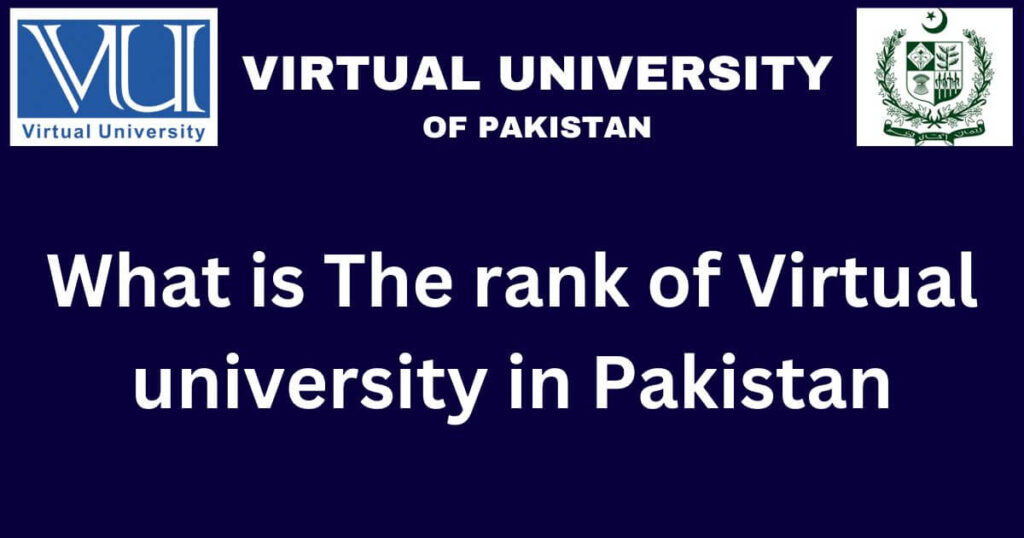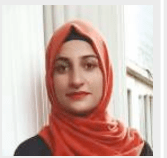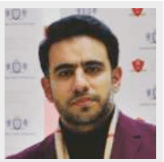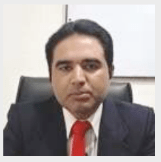
The Virtual University of Pakistan, established in 2002, addresses the need for quality education in the country by offering distance learning through modern technologies like satellite TV and the Internet. As a not-for-profit institution, it aims to provide affordable world-class education to students nationwide, irrespective of socioeconomic backgrounds. The university’s low fee structure promotes accessibility and tackles educational inequality.
The Virtual University’s federal charter ensures the recognition of its degrees by the Higher Education Commission (HEC) and acceptance both within Pakistan and overseas. With over 130,000 active students in 100 cities, the university’s widespread outreach is facilitated by partnerships with over 211 associated campuses, providing infrastructure support to students.
Background of Virtual University
The Virtual University was founded in 2002 by the Government of Pakistan, making it the first university in the country solely based on ICT (Information and Communication Technology). The vision of Virtual University is to be a globally recognized technology-based institution that enhances access to higher education while maintaining high-quality standards.
Its mission is to offer top-notch education and research opportunities to all students, regardless of age, gender, religion, or location, using modern ICT tools and materials created by leading experts in their fields. The university aims to prepare students for success in their careers, instill an entrepreneurial mindset, and promote strong ethical and moral principles for positive contributions to society. Additionally, the objective is to provide a superior working environment for faculty and staff, fostering a culture of collaboration, innovation, and research.
Accreditation and Recognition
Virtual University (VU) is an acknowledged and accredited institution in Pakistan, holding the prestigious “W” category granted by the Higher Education Commission (HEC), the primary accreditation body for universities in the country. This designation affirms that VU adheres to all the quality standards established by the HEC for higher education institutions.
Here are key highlights regarding VU’s accreditation:
- Establishment by the Government of Pakistan: VU, established in 2002 by the Government of Pakistan, attests to its official recognition and legitimacy.
- Federal Charter: VU possesses a Federal Charter, further solidifying its legal status and accreditation within the Pakistani education system.
- HEC’s Highest Category (“W”): As previously mentioned, VU holds the HEC’s highest category, “W,” serving as a robust indicator of its accreditation and overall quality.
- Curricula Aligned with HEC Standards: VU’s programs are crafted based on curricula developed by the HEC, ensuring alignment with national education standards.
- International Recognition of Degrees: The degrees conferred by VU carry recognition not only within Pakistan but also on an international scale.
- Excellence award: won in 2023 by the International Council for Open and Distance Education Netherlands.
- Cisco: Premier + Network Academy Partner.
Academic Programs
Faculty of Arts
BS Programs (4 Year)
Associate Degree Programs (2 Year)
Diploma Programs (1 Year)
Faculty of CS & IT
MS Programs (2 Year)
BS Programs (4 Year)
Associate Degree Programs (2 Year)
Diploma Programs (1 Year)
Faculty of Education
BS Programs (4 Year)
B. Ed Secondary (1.5 Year)
B.ED. Elementary Program (2.5 Years)
Associate Degree Programs (2 Year)
Associate Degree Programs (1 Year)
Diploma Programs (1 Year)
Faculty of Management
BS Programs (4 Year)
Associate Degree Programs (2 Year)
Diploma Programs (1 Year)
Faculty of Science & Technology
Faculty of Science & Technology
Associate Degree Programs (2 Year)
- Science (Math, stat & Eco) (Admissions Halted by the University)
- Science
Diploma Programs (1 Year)
- Accounting, Banking Finance
- Computer Science/Information Technology
- Economics
- English
- Humanities Distribution
- Law
- Management
- Marketing
- Mass Communication
- Mathematics
- Physics
- Probability Statistics
- Psychology
- Sociology
- Molecular Biology
This option is specifically designed for candidates who possess the required qualifications or degrees but fall short of the minimum academic criteria, with less than 45% marks or a CGPA lower than 2.0
Duration
It is a one-semester (18-week) program.
Study scheme
- MTH 001: Elementary Mathematics
- ENG 001: Elementary English
- CS 001: Computer Proficiency
Specialization Certificate
Areas of Specialization
Teaching Methodology of Virtual University
The Virtual University utilizes various learning platforms and methodologies to create a dynamic virtual learning environment for its students:
- Virtual University Learning Management System (VULMS): The university employs a specialized computer program known as a Learning Management System (LMS) called VULMS. This system acts as a central hub, like popular apps like Facebook and WhatsApp, allowing students to access course materials, engage in discussions, submit assignments, take quizzes, and communicate with instructors and peers. It is designed to be user-friendly, providing easy navigation through courses.
- YouTube: The Virtual University utilizes YouTube as an additional tool for delivering education. Recorded lectures for all subjects are uploaded to the university’s YouTube channel. This allows students to access lectures at their convenience, according to their schedules. The flexibility of YouTube enables offline viewing, providing students with a convenient way to access educational content.
- Satellite TV Channels (VTV1, VTV2, VTV3, VTV4): The Virtual University operates its television channels on satellite, freely accessible to everyone. These channels broadcast lectures at scheduled times and repeat them throughout the day. This broadcasting method ensures that students have multiple opportunities to access lectures, even if they miss the original airing. This flexibility accommodates diverse schedules and learning preferences.
- Open Courseware: As a member of the Open Courseware Consortium (OCWC), the Virtual University committed to releasing educational resources under a Creative Commons license. The VU Open Courseware website offers free access to courses, reading materials, and assessment tasks. The university exceeded its commitment by publishing over 130 courses, promoting open learning and collaboration.
- Virtual University Campuses: The university established 200 campuses across Pakistan, each serving as an exam center and study center. These campuses provide physical spaces equipped with resources like computer labs and internet access. They facilitate online Zoom classes, and orientation sessions for new students, and act as a bridge between students and the university, ensuring a seamless learning experience.
Advantage of Online Education
- Flexibility and Convenience:
- Virtual University degree programs offer unparalleled flexibility, allowing students to access lectures, assignments, and study materials at their own pace and convenience.
- This flexibility is especially beneficial for working professionals, parents, and those unable to commit to fixed schedules.
- Diverse Range of Disciplines:
- Virtual university degree programs cover a wide spectrum of academic and professional disciplines, providing options in business, computer science, arts, healthcare, and more.
- Students have the opportunity to choose programs tailored to their specific aspirations and interests.
- Global Learning Opportunities:
- Geographical boundaries are no longer a barrier to education, as virtual university degree programs offer access to renowned institutions and esteemed professors from around the world.
- This global exposure enriches students’ experiences and promotes cross-cultural interactions.
- Virtual degree programs are often more affordable compared to traditional university education, making quality education accessible to a broader demographic.
- This affordability addresses economic barriers, enabling a more diverse group of students to pursue higher education.
- Interactive Learning Environment:
- Contrary to the misconception that virtual learning is isolating, Virtual University degree programs provide interactive platforms like VULMS where students can engage with peers and professors.
- Discussion forums, video conferences, and collaborative projects create a sense of community, enhancing the overall learning process.
- Adapting to Learning Styles:
- Virtual university degree programs empower students to tailor their education to suit their preferences and learning styles.
- Visual learners can benefit from multimedia presentations and video lectures, while textual learners can delve into comprehensive reading materials.
- Skill Development for the Future:
- Virtual University degree programs integrate practical skills and the latest industry trends into their curricula.
- Graduates are well-prepared for the ever-evolving job market, and equipped with adaptable skill sets that give them a competitive edge.
- Personalized Support:
- Despite the misconception about lack of personal interaction, virtual university programs offer dedicated support through virtual office hours, and one-on-one sessions with instructors, and academic advisors.
- This personalized support ensures that students receive guidance throughout their educational journey, debunking the notion of a lack of personal interaction in virtual learning.
VU Student Enrollment and Demographics
As of the fall semester in October 2023, Virtual University boasts an impressive enrollment of 130,000 active students spread across 100 cities in Pakistan. This widespread presence underscores the university’s commitment to providing accessible and quality education to a diverse student population across the country.
In a significant milestone for the institution, Virtual University conducted its 13th convocation in 2024. This prestigious event took place in distinguished cities throughout Pakistan, including Islamabad, Lahore, Narowal, Karachi, Faisalabad, and Sialkot. The choice of such prominent locations reflects the university’s desire to reach students from various regions, ensuring that the convocation is accessible and meaningful to a broad cross-section of its graduating and undergraduate student body.
During this 13th convocation, Virtual University proudly awarded a total of 20,000 degrees to its graduates and undergraduate students. This noteworthy achievement underscores the impact and scale of the educational contributions made by Virtual University. These degrees represent a significant milestone for the students who have successfully completed their academic journey, marking the culmination of their dedication and hard work.
The multi-city approach to the convocation not only adds a sense of grandeur to the ceremony but also symbolizes the university’s commitment to inclusivity and recognition of the diverse backgrounds and geographical locations of its students. By conducting the convocation in key cities, Virtual University ensures that the celebration of academic achievements is accessible and meaningful to a wide array of students, further solidifying its status as a leading institution in the realm of online education in Pakistan.
Alumni Success Stories
Mr. Mansoor Ali Khan (Senior Anchorperson)
This is how our prior student, Mr. Mansoor Ali Khan (Senior Anchorperson), completed his degree at the Virtual University of Pakistan via online mode. He had always intended to complete his higher education, but due to his rigorous schedule, it was difficult for him to enroll physically at the college or the universities. The ICT-Based Education System at Virtual University allowed him to complete his master’s degree in media studies in his own time.

Muhammad Usama Baig
Study Program: BS Software Engineering
Batch: Fall 2014 – Spring 2018
I work as a Senior Software Engineer at a reputable software company in Lahore. I obtained my BS in Software Engineering degree from VU. The quality of lectures at VU, along with the flexibility to study at my own pace and convenience, allowed me to pursue internships and work alongside my studies. This greatly benefited both my education and career. I highly recommend VU to other students based on my personal experience.

Iram Ghafoor
Study Program: M.Sc. Mass Communication
Batch: Spring 2017 – Fall 2018
I successfully completed my master’s in mass communication from VU with distinction. Throughout my study program, VU granted me 100% merit-based scholarships, which were extremely helpful during times when I wasn’t financially independent. However, the most significant impact VU had on me was introducing me to the online world, leading me to start freelancing. Without VU, I would still be struggling with finances. VU not only helped me complete my degree but also provided me with valuable exposure to the digital world, allowing me to establish myself in the freelancing industry. It has truly been a blessing in my academic and professional journey.

Ahmad Awais
Study Program: BS Business Admin
Batch: Fall 2003 – Fall 2009
I earned my BBA (Hons) degree from VU. Afterward, I pursued my master’s in international HRM from the University of Bedfordshire, and recently, I completed my Ph.D. in Business Administration from the University of the West of Scotland (UK). Currently, I work as a Business Lecturer at the largest college network in the UK, London School of Science and Technology. In addition to teaching, I also serve as a module leader and dissertation supervisor for Level 6 students. Throughout my master’s degree, I had the opportunity to participate in three consecutive work placements within the university, where I was recognized with the best performer award.

Dr. Shahid Minhas
Study Program: BS Mass Communication
Batch: Fall 2004 – Spring 2008
In 2008, I graduated with a bachelor’s degree in mass communication from the Virtual University of Pakistan. Currently, I hold the position of Head of the Mass Communication Department at GIFT University. I had a positive experience with VU’s education system, finding it informative and supportive. The university’s TV channels were especially beneficial for students. VU holds the distinction of being the first university in Pakistan to introduce virtual education and a learning management system (LMS). This pioneering approach allows for affordable and high-quality education right at your doorstep.

Virtual University's Rank in Pakistan
- Accreditation and Recognition:
- The Virtual University of Pakistan is accredited by the Higher Education Commission (HEC) of Pakistan.
- Its degrees are acknowledged and accepted by employers and professional bodies in Pakistan.
- Comparison with Allama Iqbal Open University (AIOU):
- Both VU and AIOU are recognized as the base of distance learning education in Pakistan by HEC.
- VU utilizes a custom-built Learning Management System (LMS) with features like video conferencing, which might be viewed favorably.
- VU’s technological infrastructure, including TV channels for 24-hour lectures and involvement in national projects, is highlighted as a strength compared to AIOU’s reliance on traditional self-study materials.
- Teaching Methodologies:
- VU’s use of a custom LMS with advanced features is mentioned as a potential factor that could impact its ranking compared to AIOU.
- Infrastructure:
- VU’s technological infrastructure, including the custom LMS and participation in national projects, is considered robust.
- Longevity and Affordability:
- Both VU and AIOU have a longer history, and VU is known for its affordability with low tuition fees.
- Accreditation and Support Services:
- Both VU and AIOU are accredited by HEC, ensuring the quality of education.
- AIOU offers various support services like library resources and counseling.
- Scope of Programs:
- Both universities offer undergraduate and graduate programs.
The emphasis on technological advancements, a custom-built infrastructure, and affordability could potentially contribute positively to its ranking compared to Allama Iqbal Open University in the aspects mentioned. The HEC’s endorsement further ensures that qualifications from VU mirror the educational benchmarks set by traditional universities in Pakistan.
